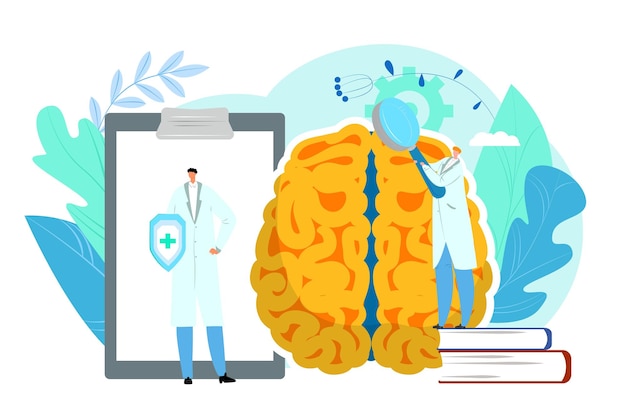
Importance of Brain Health
8 Steps
Supplements
Other Remedies
You may live longer than your parents or grandparents did, thanks to breakthroughs in science and technology. But will your brain remain healthy and sharp along with your body? Let’s discuss what science says about brain health throughout your prime of life and into your golden years.
Imagine yourself in your 90s. What kind of lifestyle do you want to live? Does your current lifestyle support that vision? The daily choices you make affect the health of your brain not only today but also how it will function long into the future. The good news? If you realize that you need to make improvements in your lifestyle choices, it’s never too late.
Even better news: The steps that slow a decline in brain function are simple and easy. It’s a “no-brainer.” You only need to actively take the steps.
What Is Brain Health?
A good definition for “brain health” refers to the ability to think, move, concentrate, remember, and regulate your emotions without concerns.
A healthy brain means that you can do the following:
Pay attention, perceive and recognize sensory, learn and remember, solve concerns and make decisions, regulate emotions, move about, and communicate.
Why Should You Monitor Your Brain Health?
Sometimes, we forget how important the brain is because it functions automatically. For the most part, people walk, chew, breathe, sing, or talk without much effort. Our lungs inhale or exhale at 12 to 20 breaths per minute without being prompted. Your heart beats at 60 to 100 beats per minute outside our control. A healthy brain manages all of these functions.
It’s only when we lose the ability to walk, talk, remember, or recognize people that we realize something may be wrong with our mental functioning. You don’t need to wait until it’s too late to monitor and take care of your brain!
Wouldn’t it be great to spend your senior years dancing with friends, running in the park, and volunteering in the library instead of relying on a caregiver? While not all of this is under our control — genetics and outside forces can sometimes be at play — every person can do something today to maintain a healthy brain for as long as possible.
Steps for Keeping Your Brain Healthy
In recent years, scientists discovered that cells could regenerate and repair themselves in certain areas of the brain, but this depends on the lifestyle choices you make today. Luckily, these choices are simple and easy.
Physical Exercise
Studies show that exercise is one of few things that actually promotes new brain cell growth. When these brain cells mature, memory and thinking improve. There are a ton of exercises to try! Find what works for you and your body.
For brain cell growth, experts recommend 150 minutes of moderate-intensity or 75 minutes of vigorous-intensity aerobic physical activity per week. You should exercise for at least 10 minutes each time, focusing on muscle strengthening on two or more days each week. Imagine the added benefits of protecting your brain from the hazards of heart disease and obesity! You are worth it.
Medical Health
Your brain depends on a healthy blood supply for adequate oxygen and nutrition. Any disease that affects the heart, lungs, and blood vessels will speed up brain degeneration. By keeping your blood vessels elastic, you maintain a healthy blood pressure, which ensures adequate blood flow to the brain. On the other hand, uncontrolled blood sugar level and cholesterol plaques can damage your blood vessels.
We’re not joking! Those regular health checks and doctor visits are important! It’s important to monitor your health regularly not just at your annual exam — including your blood pressure, cholesterol, and blood sugar. That way you can do something about your lifestyle and environmental exposures before it gets to the point where medical intervention is needed. This leads us to the next important step.
Eating Well
What’s the best diet for brain health? A plant-based diet, Mediterranean diet, or a diet rich in leafy greens and antioxidants is not only good for weight control but also for the brain. Some nutrients to look for include polyphenols, resveratrol, and omega-3 fatty acids. Polyphenols like curcumin promote brain cell growth and performance. The same thing is true with trans-resveratrol, which you will find in grapes, tree nuts, dark chocolate, and berries. Some good plant-based sources of omega-3 fatty acids include walnuts, flaxseeds, and algae oil.
Eat foods rich in folic acid and folate (Vitamin B-9), cobalamin (Vitamin B12), vitamin E, and vitamin C, which are excellent vitamins for brain health. Deficiencies in these vitamins can lead to poor cognitive function. For best brain health, avoid refined sugar and most saturated fats (coconut oil is an exception).
Sleep
Did you know that acute sleep deprivation can cause brain atrophy? This means that the brain shrinks! While the effects of one or two nights of sleep loss are reversible with one night of good sleep, if poor sleep habits persist, recovery tends to take longer, too. With brain atrophy, imagine the impact on your attention, memory, and decision-making.
Adults should get 7 to 9 hours of sleep for optimal health. This recommendation is based on reviewing thousands of articles on sleep and its health benefits, and the hazards of lack of sleep. An adequate amount of sleep will improve memory, attention, behavior, learning, mood, quality of life, and mental and physical health.
Mental Fitness
How does mental fitness or mental exercise work? Several studies have shown that mental stimulation, such as games and puzzles, can improve brain health and function. Did you know that mental exercises stimulate brain cell growth? In those at risk for Alzheimer’s disease, cognitive impairment, and dementia, mental exercise stimulates the brain cells to grow. It also restores the damage caused by depression.
You can stimulate your brain by engaging in hobbies and learning new crafts. Doing a stimulating activity can help you learn, remember, and find creative solutions.
Quit Smoking
The long-term effects of smoking are not only confined to the lungs. Why? Because smoking causes the blood vessels to thicken and narrow. This affects the blood flow to the brain. When this happens, the risks for stroke, hypertension, and heart disease increase.
Did you know that your risk for a heart attack drops after 1 year of not smoking? Quitting smoking for just one year drops your risk for heart attack dramatically. Within 2 to 5 years, your risk for stroke is about the same with that of a non-smoker. Protect your brain from the consequences of smoking. Quit smoking — the sooner, the better.
Minimize Alcohol
While alcohol is not good for your overall health, if you can’t avoid social drinking, choose red wine, which contains resveratrol, a heart-healthy molecule. Light to moderate intake of red wine provides heart-healthy benefits which translate to brain protection. When your heart pumps, it sends a healthy blood supply to the brain.
Avoid the damaging effects of long-term and heavy alcohol drinking. Alcohol has a direct toxic effect on brain cells. Its indirect effects include thiamine deficiency, which is common in alcoholics. Liver damage also ensues, which exposes the brain to toxic waste products normally cleared by the liver. Studies have found that when alcoholics abstained for a year, their brain structure and function improved!
Be Social
Did you know that people who are more social tend to live longer, healthier, and happier lives? Several studies have shown this association. Although the mechanism is unknown, experts think that positive social stimulation enhances the creation of new nerve cells and even pathways. Additionally, social activities tend to reduce stress and keep depression at bay.
Gather your friends and play cards. Travel to new places and watch shows in theaters. Go out and meet your neighbors. If you love to cook, volunteer in your local soup kitchen. Your brain will thank you.
Are There Brain Health Supplements?
Many studies have shown evidence that certain vitamins, minerals, and other food supplements can boost brain health. The best way to get your nutrients is still the natural way. Nothing can beat a healthy diet of whole grains, green leafy vegetables, and fruits. But there are situations when you may need to take supplements. This would prevent vitamin and mineral deficiencies that could be harmful to the brain.
Probiotics & Psychobiotics
Trillions of bacteria live in the gut and affect brain function through the gut-brain axis. Stress, infection, drugs and antibiotics, and illness tilt the balance in favor of the harmful bacteria. This alters the balance of brain chemicals that improve brain function and mood.



